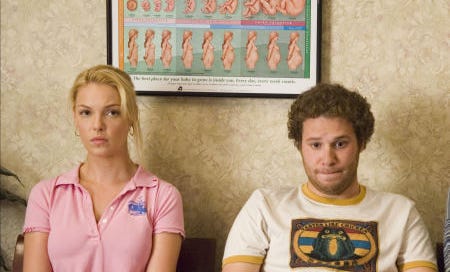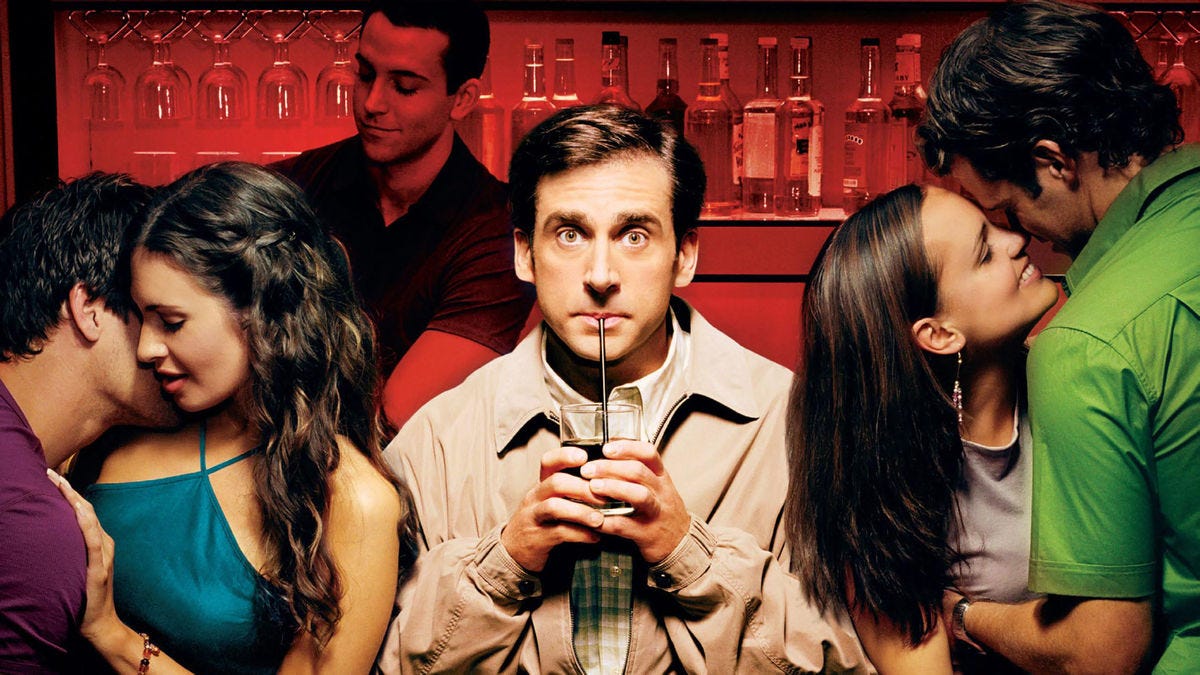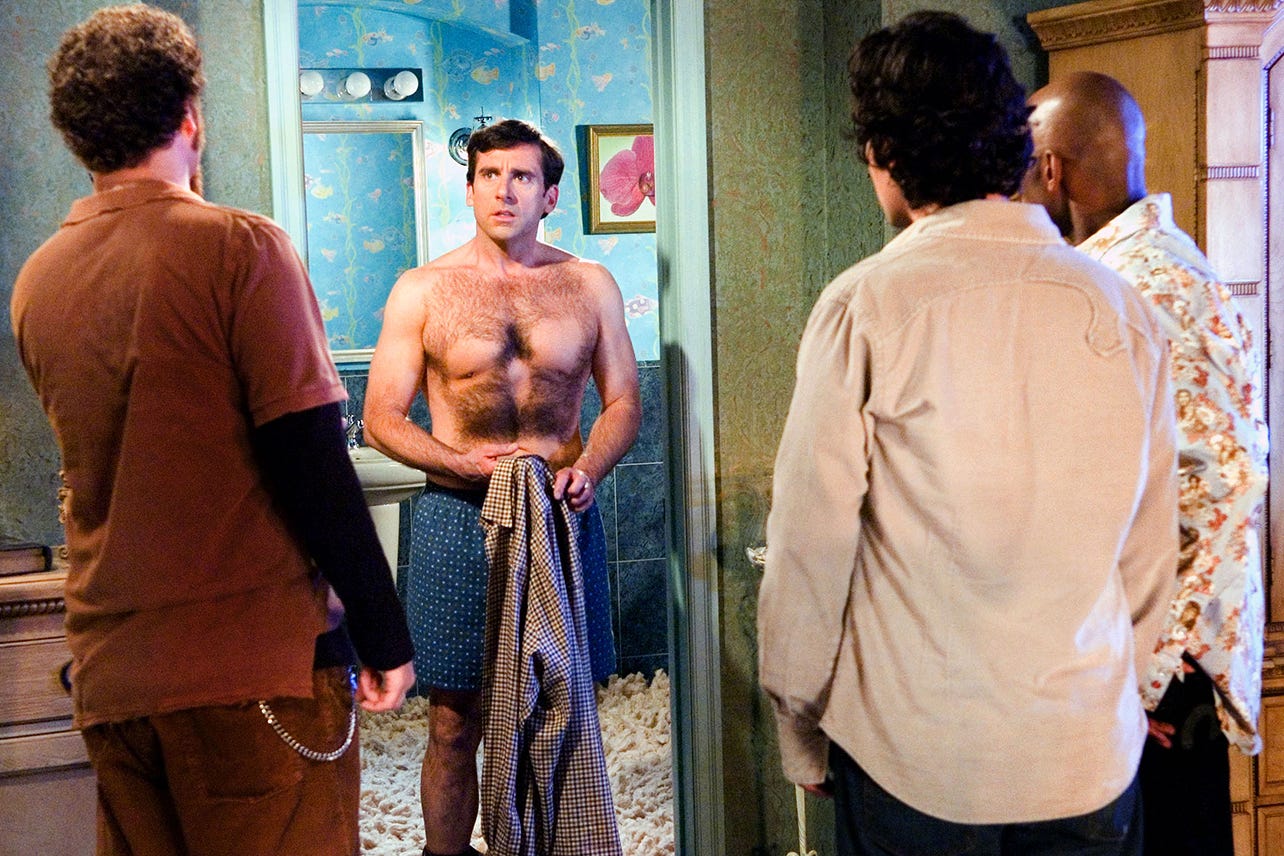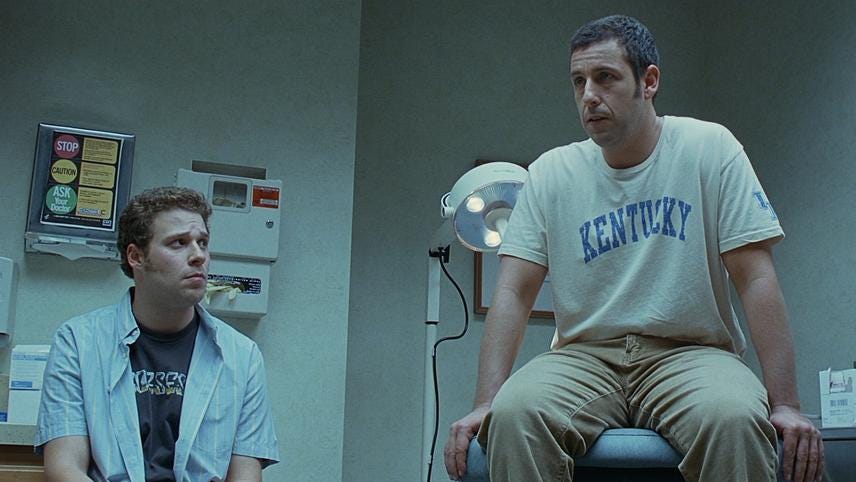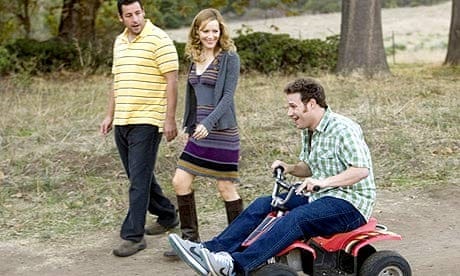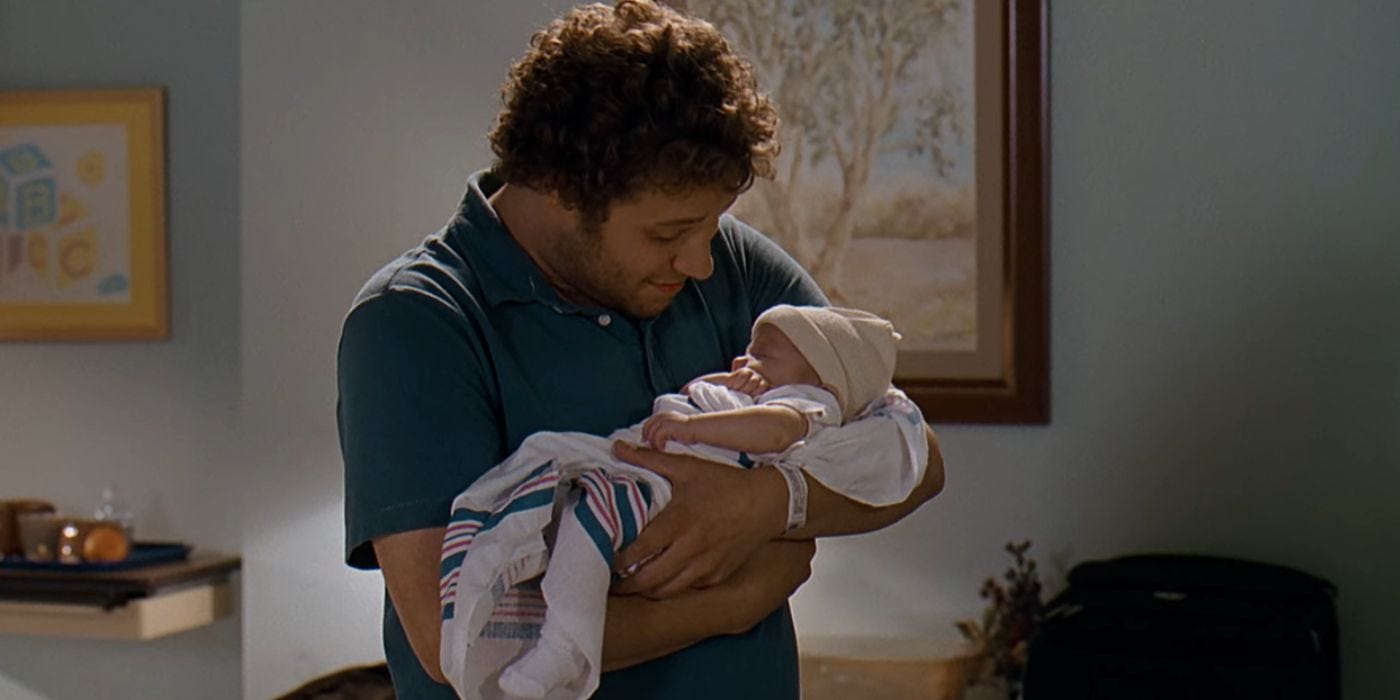Judd Apatow, for better or worse, is one of the strongest comedic voices in film from the best twenty-five years. Whether looking at his work on the small screen (Freaks and Geeks and Undeclared) or at his big screen efforts, his vision and ideas dominated the first decade of the century. His intentions for the genre showed a shift from the absurdity of the 1990s and early 2000s, focusing on genuine dilemmas and characters, adding pathos to stories that focused on broad appeal previously. And while absurdity in film comedy never went away, the films and television influenced by Apatow in the following years signaled a more personal approach to the material. By grounding the characters in the real world and showing side characters we know to be real people, Apatow enforced the absurdity of the every day.
Looking at the comedies that dominated the culture before Apatow’s debut with The 40 Year Old Virgin, we can see why Apatow stood out from the rest. Adam Sandler had dominated the box office for years with his brash and broad comedies such as 50 First Dates and Little Nicky. Saturday Night Live had created feature films for their popular characters such as Superstar and A Night at the Roxybury, most of which didn’t catch on with the broader audience. While film comedy was not in jeopardy of disappearing (something that seems far more likely with modern film culture), they rarely if ever existed in a recognizable world. Apatow highlighted that we could be the stars of comedies ourselves, that our lives were humorous and that our friends who made us laugh like no movie ever had could be on the big screen.
Of Apatow’s films from the 2000s, The 40 Year Old Virgin is the most heightened of them. Following the titular 40-year-old Andy Stitzer (Steve Carell) after his coworkers discover he’s a virgin. Initially believing he’ll be mocked and belittled, instead the three guys who befriended Andy band together to try and get him laid. They each have their own approach to the situation, and Andy’s ineptness with woman leads him to constant and hilarious failures, but by the end he’s found the love of his life who accepts him for who he is.
While the situations Andy and his friends find themselves in are wacky, nothing that occurs in the film is impossible. These are real situations with real, if broad, people. While Andy’s situation is improbable, it’s far from impossible, and Apatow includes a scene between Andy and David (Paul Rudd) where Andy explains who he has remained alone through a series of unfortunate events and confidence crushing moments. While there are jabs made at Andy from various characters, they are made in fun and Andy is free to jab right back. Even the most bizarre event in the film (Andy’s virginity) is treated with respect and a tone of grounded reality.
There are films that would (and have) taken similar subject matter and made them into farce. The American Pie made an entire franchise with the same bones as this film. But while those films would go on to show people eating dog feces and having sex with a surprisingly robust amount of foods, The 40 Year Old Virgin experiences moments we could stumble into tomorrow. We receive bad dating advice and it leads to disaster. We try some new grooming technique and it’s incredibly painful. We try to take someone home and they become sick. These are funny situations, but they are also true to real life. American Pie and films in a similar vein to it exist in a glossy world of excess and unlikelihood.
Apatow went even further in his take on realism in comedy with his follow up Knocked Up. This time we follow two young strangers Ben and Alison (Seth Rogen and Katherine Heigl) who, after a one night stand, discover that Alison is pregnant. Despite having nothing in common, as Alison is a successful entertainment reporter and Ben is an unemployed stoner, they decide to try and be a couple and work together to raise their child. Their budding romance is contrasted with the almost loveless marriage between Alison’s sister Debbie and her husband Pete (Leslie Mann and Paul Rudd). Along with this possible ghost-of-relationship-to-come, Ben’s stoner friends add to the vibrant cast of this film that lives as a comedy but contains real stakes.
This film completely removes the veneer of absurdity that Apatow already barely kept for 40 Year Old Virgin. Many of the situations that crop up in Knocked Up are pulled directly from Apatow’s real life relationship with Leslie Mann. The argument Ben and Alison have that leads to Ben being kicked out of the car and ends with a screaming match at the gynecologist was directly pulled from their life. Ben’s stoner friends all go by their real names, which allowed them to more easily improvise on set. The doctor who ultimately delivers the baby is rude and dismissive, another truth that Apatow brings from his own life. By injecting the film with events from his life Apatow succeeds in completely dismantling the varnish of the studio comedy and presenting a version of truth on screen.
The film also takes a more balanced approach to the more serious moments. An accidental pregnancy is a genuinely frightening situation to be, especially in the scenario presented in the film. The moments between Ben and Alison where the are considering their future together are as important to the crafting of the film as the humor. While The 40 Year Old Virgin did have genuine relationships at the heart of the film, they are not as important or in touch with reality as those portrayed in Knocked Up. This film is only a few steps removed from being a grounded drama, something we’ll see Apatow attempt to tackle in his next film Funny People.
Funny People once again takes elements of Apatow’s life and blends them in with the story he wishes to tell. The film follows George Simmons (Adam Sandler), a massively famous comedian who’s career is a parallel to Sandler’s own. After being diagnosed with an aggressive form of cancer and given a very low chance of survival, George is forced to confront past mistakes he has made. He eventually runs into struggling comedian Ira (Seth Rogen), who he hires as a writer and personal assistant. Ira becomes a confidant, and initially the only person to know about George’s cancer. After finally convincing George to tell other people, George tells his ex-fiancée Laura (Leslie Mann), rekindling a relationship between the two despite Laura being married with two children.
Taking inspiration from The Great Gatsby, Funny People is the most stern and solemn of Apatow’s first three features. While there are some humorous bits and the film revolves around the business of comedy, many of the comedic moments are undercut with a deep melancholy. When not directly showing the comedians performing on stage (in which the performances wrote their own material for the scenes) the film spends it’s time in a mélange of sadness and grief. Here the comedic moments are explicitly used as coverage, as a way to hide the pain that exists under George and Ira’s fragile ego.
Mapping out the three films back-to-back, they form a palindromic-like structure where The 40 Year Old Virgin and Funny People act as inversions of each other on the scales of humor and character. In the first film the situation exists closer to absurdity and the characters react in real but progressively humorous ways. In Funny People, everything including the stand up is treated with an intensity not seen applied to anything in The 40 Year Old Virgin. Comedy is their livelihoods, their day-in day-out existence in Funny People, and it casts a sheen on the act of being funny. Being funny becomes work, and we see how joking amongst friends can at times be a chore for our characters. While seeping into every aspect of their lives it also becomes unnatural, an automatic reaction, and when they aren’t able to shield themselves using comedy they are even more vulnerable than someone who doesn’t do comedy.
The endings of these three films shows Apatow’s gradual sense of disillusion and dissatisfaction with the traditional comedy format. The 40 Year Old Virgin gives us our happy ending, with a song and dance number and Andy ending up with the woman he loves. This plays into the over-the-top nature of many mainstream comedies of the time, detaching completely from reality in it’s final moments. Knocked Up gives us a more vague, if still upbeat, ending. After having a massive falling out, Ben and Alison reunite for the birth. They put aside their differences for the birth, and after they decide they will try again to stay together. Their future is uncertain, but so are the futures of all young lovers thrust into adulthood. Funny People gives a tiny uplift at the end, but is by far the most downbeat of all three. After George fails to win back his ex-fiancée and blames Ira for interfering, he fires Ira in a fit of rage. Visiting him at his day job a few weeks later, George presents Ira with some jokes he’s written for the young comic, and it ends with them attempting to mend their friendship, but it ultimately feels for more fragile and surface level than the relationships explored in Apatow’s first two features. As Apatow drifted further away from outright comedy, so did his films drift away from hope and uplift.
After Funny People Apatow’s filmography slowed considerably and made less and less impressions on the culture at large. Having directed only four features in the subsequent 15 years, his legacy holds mostly with his first three features. The lasting legacy of Apatow’s work is easily the improvisational manner of many of his scenes. While he wasn’t the first director to work in this manner, his films popularized the technique of simply rolling cameras and letting the actors work within the scene to find the funniest way for things to play. Both him and Adam McKay made this a stalwart of the modern comedy. And while the grounded, realistic comedy he made popular still has a place in the modern film landscape (as much as any comedy as a place in said landscape), the world of comedy has shifted dramatically to a more absurdist sensibility.
While comedies have all but disappeared from the box office, popular comedies such as I Think You Should Leave, the Saturday Night Live sketches by Please Don’t Destroy, and many of the most popular Tiktok comedy accounts, work in a much more heightened, hectic sensibility. Apatow has focused mostly on producing over the last decade, and his latest directorial effort The Bubble was poorly received by both critics and audiences. But the lingering effects of his films exist. Many comedies attempt to give us moments of clarity for our comedic protagonists, moments of humanity. These are the moments that Apatow was best able to draw from his characters, and it seems when he leaned too far into these humanistic traits in Funny People is when he somewhat lost his directorial touch. But when a comedy film does reach theaters these days, they tend to have a heart at the center of them, and I believe Apatow is the one to thank for that. Comedy, like most things, exists on a pendulum, and when it comes back to the grounded, realistic approach, then will be a time of reconsideration of Apatow’s work.
